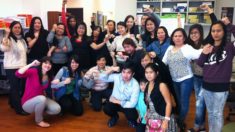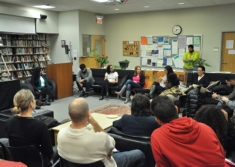Damayan means “to help each other” in Filipino.
Damayan is a grassroots organization based in New York and New Jersey of and for Filipino im/migrant workers and led by Filipino women domestic workers. Damayan was officially founded in 2002 and became a 501 C 3 in 2003.
Our mission is to educate, organize and mobilize low wage Filipino workers to fight for their labor, health, gender and im/migration rights; to contribute to the building of the domestic workers movement for fair labor standards, dignity and justice; and to build workers’ power and solidarity towards justice and liberation.
We promote discussions on gender, race, class, globalization and forced migration to raise public awareness and support against the systemic causes of the exploitation of low wage workers, particularly migrant women domestic workers.
Damayan advocates against the labor export program of the Philippines and exposes corporate neoliberal economic policies in the country as the primary root of the chronic poverty and widespread unemployment that push Filipinos, mostly women, to migrate to foreign lands in search of livelihood. Currently, 12 million Filipinos, over 10 percent of the country’s population, are overseas as migrant workers in about 200 countries around the globe. Last year, they sent home $20.1 billion in remittances to support their families, thus propping up the Philipppines’ economy while working in conditions of widespread poverty and abuse.
In November 2011, Damayan launched its flagship campaign, “BAKLAS” (meaning to dismantle and break free) against the labor trafficking and modern slavery of Filipino workers.
In a holistic approach to address the various problems of Filipino workers, Damayan implements programs on labor, health, gender and im/migration. Using these services, we build our membership program and the workers leadership program.
As part of the Seminar on Public Engagement and Collaborative Research, Damayan worked with faculty coleader Sujatha Fernandes to organize political education workshops for migrant and domestic workers.


